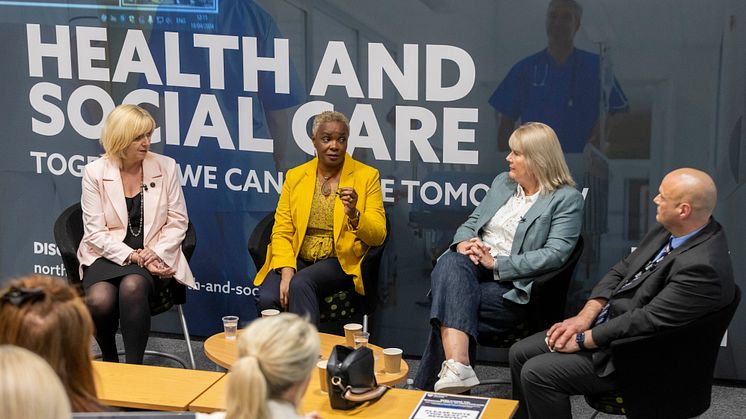
Press release -
Healthcare workforce agenda driven forward at Northumbria University event
Health leaders from across the UK have set out their views and vision for developing a sustainable, supported, and skilled healthcare workforce for the future at a Northumbria University event.
The half-day, hybrid conference, entitled ‘Working Well in Healthcare: The Changes, Challenges and Opportunities for Developing your Workforce’, brought together expert speakers, senior leaders, people managers and workforce development and education leads to discuss the challenges and opportunities facing the sector, as outlined in the NHS Long Term Workforce Plan.
With speakers including Professor Mark Radford, Deputy Chief Nursing Officer for England, Professor Alison Machin, Chair of the Council of Deans of Health; Professor Laura Serrant, Leadership, Development and Inclusive Practice Specialist, and Emeritus Professor Debra Porteous, the event focused on the goals of the Plan, which aims to tackle significant challenges around recruiting, developing, training, and retaining people within the NHS.
The conference highlighted a number of ways that the industry can develop, nurture and support its professionals in reaching their career goals by adopting innovative approaches to work, wellbeing, training, and productivity. It also reinforced the importance of ensuring equity across the workforce when it comes to supporting staff retention and reforming the way the industry recruits, deploys and offers training opportunities.
During their keynotes, Professor Mark Radford provided an overview of the NHS Long Term Workforce Plan, its ambitions for growth, retention and reform, and the important role of higher education institutes in this transformation, while Professor Alison Machin outlined the vision for the Council of Deans of Health, which represents 105 university members across the UK and seeks to advance and promote healthcare education and research for the public benefit, through influencing Government policy and connecting their members.
Her session also highlighted the need to create psychological wellbeing and a sense of belonging to better support healthcare professionals in their roles and ultimately improve retention.
Professor Laura Serrant picked up on these themes further, focussing on the importance of wellbeing support and the need to drive equality, equity and social justice, to retain invaluable talent. She also explained the value of a global perspective when considering workforce development in the UK.
Deputy Chief Nursing Officer for England, Professor Mark Radford, said: “The way in which we address the issues in our healthcare workforce is going to be different going forward. There will be a significant shift in the next few years towards surveillance and support.
“The NHS has been provided with £2.4 billion funding, in addition to what we already have; that is a considerable investment package which will significantly expand domestic education, training, and recruitment to have more doctors, nurses and other healthcare professionals working in the NHS. We need to think about how we can get people involved in university programmes and build career opportunities by expanding existing pathways – including internships, medical degrees and apprenticeship programmes.
Professor Serrant said: “Global health is about how we understand the contributions that we all make individually and collectively. The space we are trying to create is one in which people feel they are confident and competent to think about their intentions, as well as helping and supporting other people. Belonging and inclusion – in our education, practice, and policy – are fundamental to the continuity of the people we want to attract and retain.”
The event also included a panel session where speakers, including Professor Porteous, discussed topics including the recruitment processes, the role of Professional Nurse Educators, the future of international recruitment, the challenges around redeployment, and the importance of emotional intelligence and supporting soft skills.
As part of its commitment to helping the industry overcome its recruitment challenges, Northumbria University is focusing on its continued contribution to developing the current and future healthcare workforce.
Professor John Unsworth, Deputy Pro Vice-Chancellor for the Faculty of Health and Life Sciences at Northumbria University was the host of the conference. He said: “At Northumbria, we are proactively driving forward educational growth and system support focused on delivery of the NHS Long Term Workforce Plan. We strive to widen course participation by offering as may routes into higher education as possible. This includes increasing Nursing and Advanced Health Practitioner (AHP) places; developing new apprenticeships and routes to entry; working to improve progression to employment; and working on Advanced Clinical Practitioner pathways and Primary Care programmes.”
Northumbria University’s new Centre for Health and Social Equity (CHASE), which will be a flagship centre of excellence for research and training to meet the needs of stakeholders and communities in Newcastle, across the region, nationally and beyond, will increase the University’s capacity to train new professionals and deliver more continuing professional development courses for nurses, midwives and allied health professionals.
More detail about the event, the keynote presentations and the panel discussion, is available on the Northumbria University website here.
The hybrid event was designed specifically for senior leaders, HR and people workforce managers in the NHS, private and third sectors, in a bid to support and develop the next generation of nursing and healthcare professionals and was the first in a series of similar events. Through its continuing professional development (CPD) and workforce programmes, Northumbria University plays an important role in tackling workforce shortages and supporting NHS England to deliver on their plan. For more information visit: https://www.northumbria.ac.uk/business-services/education-and-training/.
Topics
Categories
UNIVERSITY OF THE YEAR 2022 (Times Higher Education Awards)
Northumbria is a research-intensive university that unlocks potential for all, changing lives regionally, nationally and internationally.
Two thirds of Northumbria's undergraduate students come from the North East region and go into employment in the region when they graduate, demonstrating Northumbria's significant contribution to social mobility and levelling up in the North East of England.
Find out more about us at www.northumbria.ac.uk
--- Please contact media.communications@northumbria.ac.uk with any media enquiries or interview requests ---








